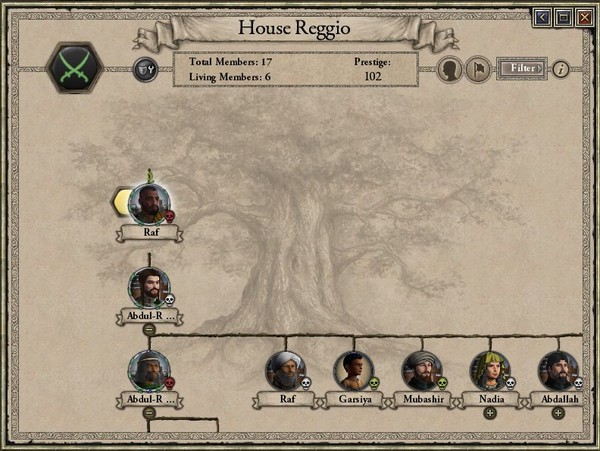Part 27: Decade of Turmoil
Chapter 27 – Decade of Turmoil – 1405 to 1414The death of Sultan Ma’n hit Al Andalus hard, very hard. He had proven to be a stabilising force in Iberia, repelling countless Christian invasions and quelling any unrest within Al Andalus, and his death threatened to plunge the sultanate into a long period of unrest.
The Sword of Allah’s conquests ranged from Lisboa to Jerusalem, but the Holy Land couldn’t exactly be ruled from Qadis, so the first order of business was sending young Khudayr and his regents to rule the Sultanate of Filastin.
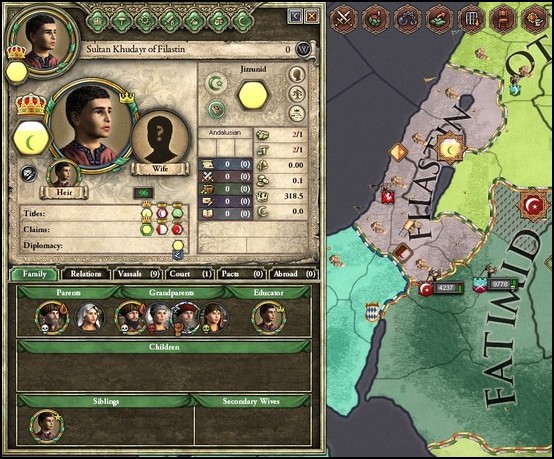
Ma'n’s firstborn son, Sayf, succeeded to Al Andalus itself. As he was still a mere child, however, the Majlis would rule in his name until his coronation, about a decade later. Within the Majlis, it was a rich landowner by the name of Ali Ghizvanni who quickly rose to power, with the merchant-turned-politican sweeping into power and declaring himself "Grand Vizier" - the first since Musa, the Bull of Caceres.
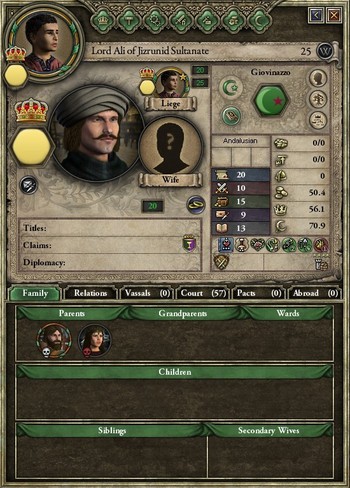
As always, however, there were many those who opposed the new Grand Vizier - especially the old names of the Majlis, who detested the hold that a mere merchant had on the Sultanate. Most prominently, Emir Abdul-Razaq of Palermo emerged as a staunch rival to Grand Vizier Ali, with the Jizrunid emir sure to cause trouble in the near future.
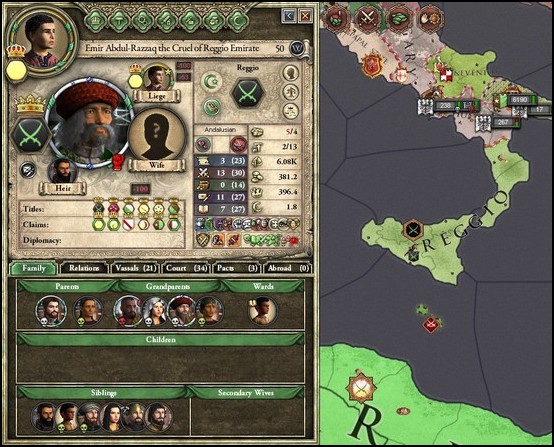
Back in Qadis, Grand Vizier Ali immediately began dictating policy by declaring war on Christian Iberia, which now consisted of Portugal, León, Castille, Navarre and Aragon, all united under a single crown. The united kingdoms had recently been suffering through internal turmoil, however, so Ali was expecting an easy enough war, with the Grand Vizier personally leading the Mubazirun across the border, and attacking the Christian enclave of Silves.
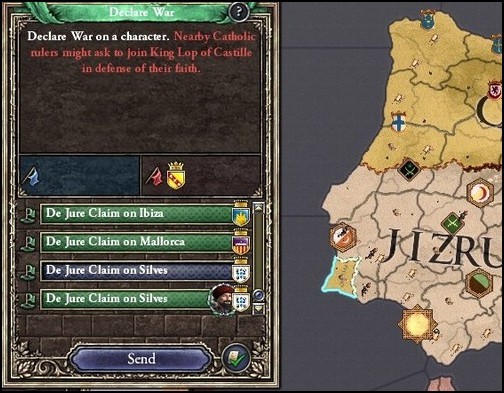
Unfortunately for him, however, the Iberian Christians were not a beaten force just yet…
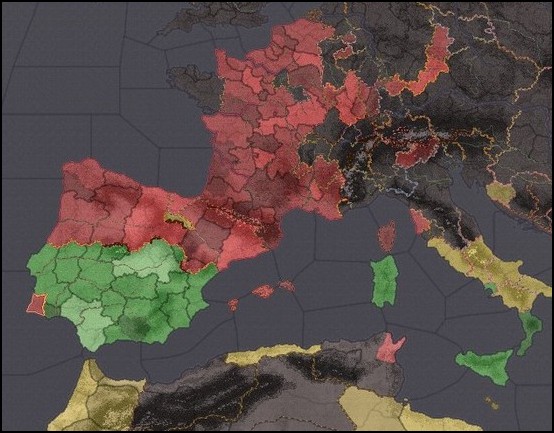
King Lop had been expecting another Muslim attack for years now, and had spent his time wisely negotiating a defensive pact with France, the only nearby power who could bring a halt to the recent waves of Andalusi expansion.
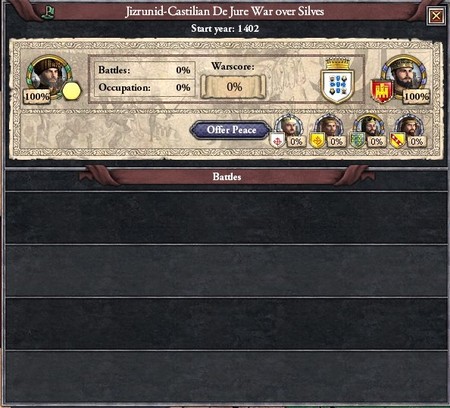
So within days of the war being declared, tens of thousands of Christians flooded across the border, assaulting and capturing half a dozen forts in quick succession.
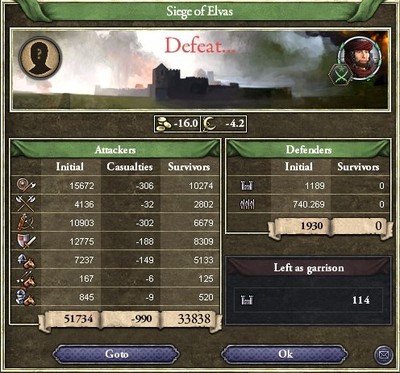
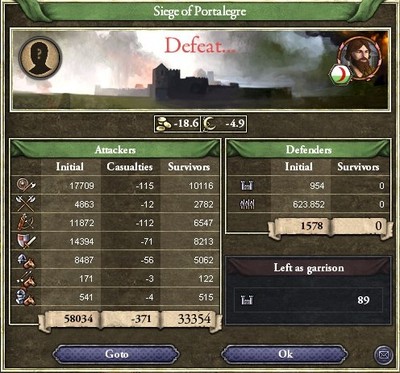
To his credit, however, Grand Vizier Ali did not panic. Surrounding himself with experienced generals, he pulled his forces back and waited for an opportune moment to strike. That moment arrived about a month later, when an ambitious French general drifted too far south and lay siege to Tulaytullah, allowing Ali to swing north and freely attack him.
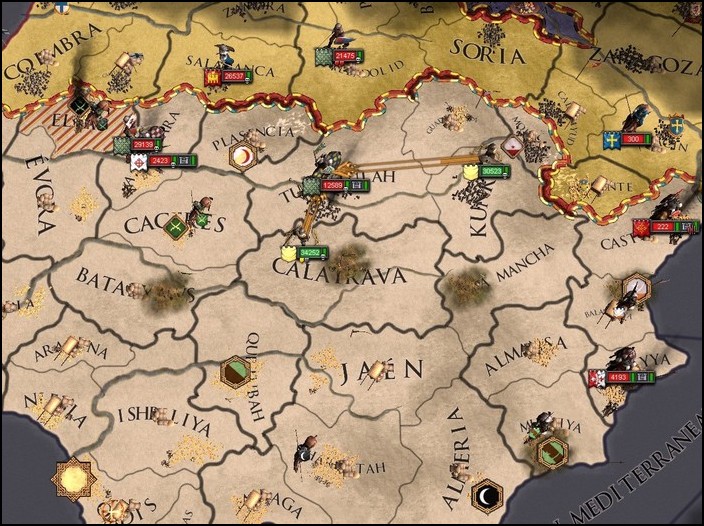
The Christians were obviously not expecting such a sudden attack. The Andalusi managed to quickly overwhelm and surround them, and within mere hours, every Frenchman on the battlefield was dead or in chains.
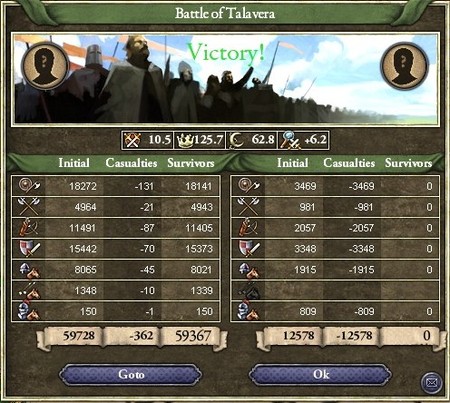
Hoping to capitalise on the victory, Grand Vizier Ali immediately went onto the offensive, pinning down a smaller Castilian army at Guadalajara.
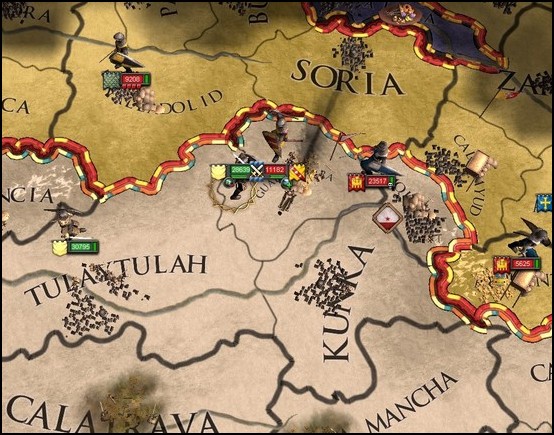
This time, the Christians were able to coordinate their forces and quickly reinforce the battle, but it wasn’t enough to shift the tide in their favour. After four hours of thick fighting, the Andalusi forced the Castilians to retreat in disarray, leaving 20,000 corpses littering the field behind them.
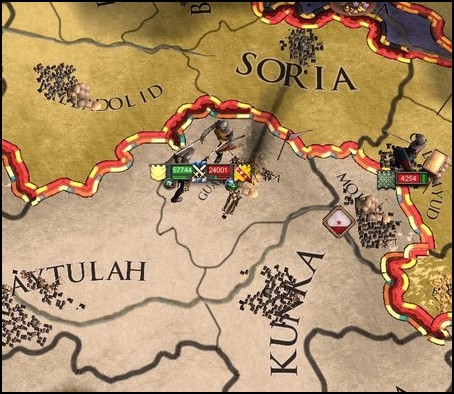
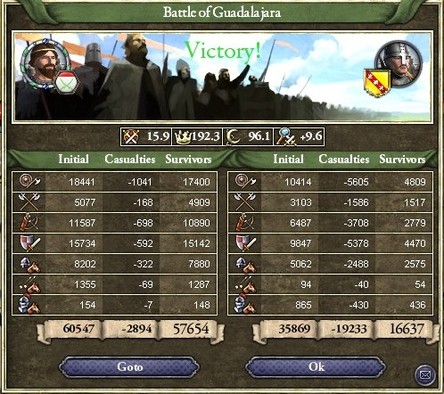
Shortly afterwards, Ali received news that the French were attempting another invasion, from both the west and the south. The vizier sent half of his men westward, engaging a 30,000-strong French army near the city of Moraleja, where they were thrown back into Castille.
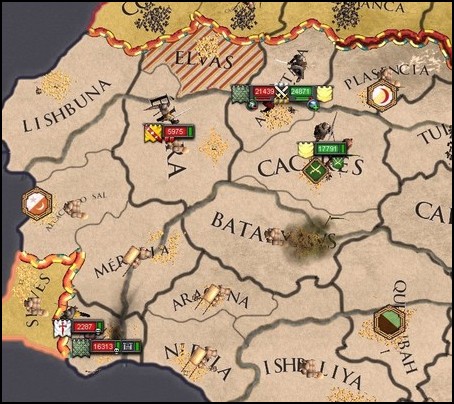
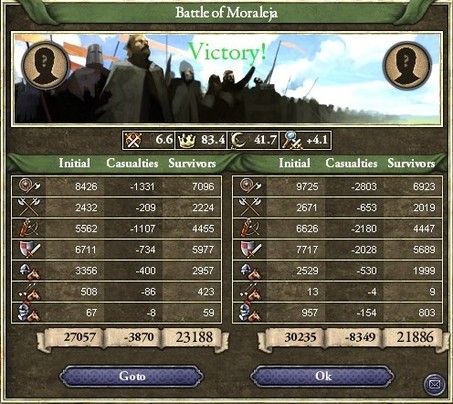
At the same time, the other 15,000 Andalusi attacked the second French force, which held a slight numerical edge. Through the use of their superior cavalry, however, the Andalusi were able to flank and rout the Christians, pushing them back into Silves.
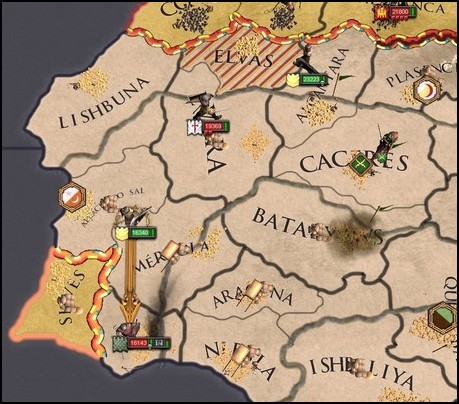
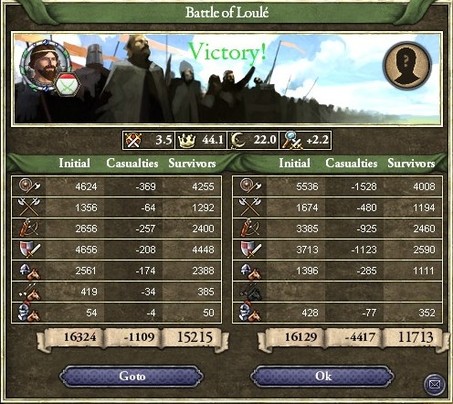
With that, the French were forced to fall back and the war turned firmly in favour of the Andalusi. Grand Vizier Ali shifted to a more defensive strategy, holding the border in the north whilst a small contingent of the Mubazirun was sent to capture Silves. As they neared the Castilian fortress, however, a significantly larger army struck forward and engaged the Muslims.
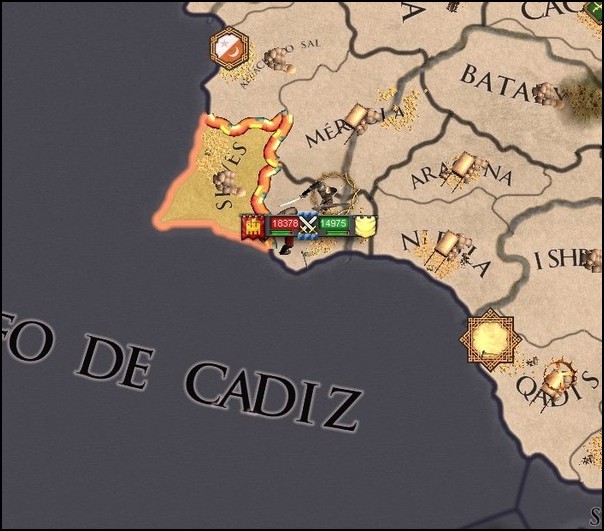
The battle was close and bloody, with thousands falling on both sides of the field, but it was the elite Mubazirun who came out on top. As the chaotic Castilian levies fled the battlefield en masse, the Andalusi stormed the royal pavilion and captured King Lop himself, carting him to the Grand Vizier in chains.
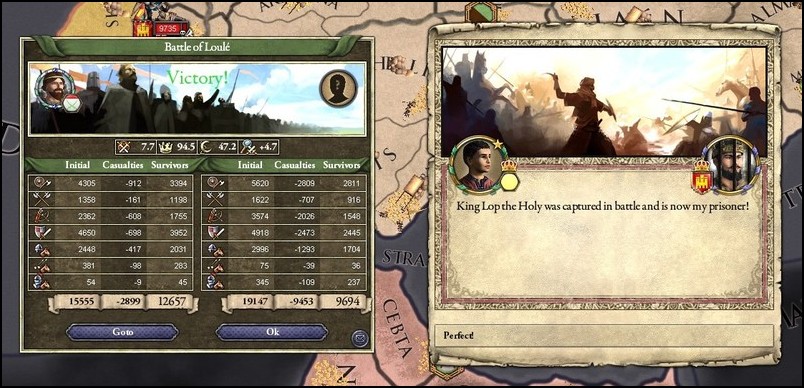
With that, the war was brought to a halt. At the behest of Ali, King Lop agreed to cede Silves in a relatively favourable peace, returning to his capital of Burgos in humiliation.
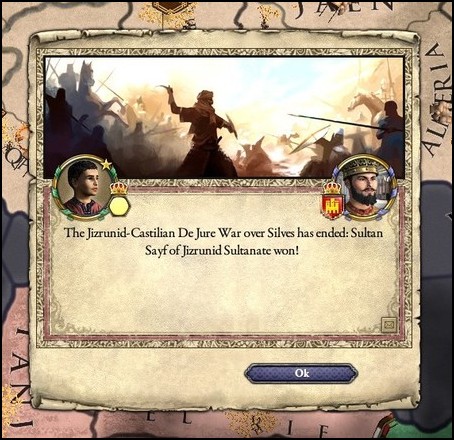
Across the Mediterranean, meanwhile, another war was just coming to an end. The Catholic Basileus of the Latin Empire managed to repel the Nicaean attempt to restore the Eastern Roman Empire, but at great cost, with half of his Orthodox vassals rising up in massive independence revolts.
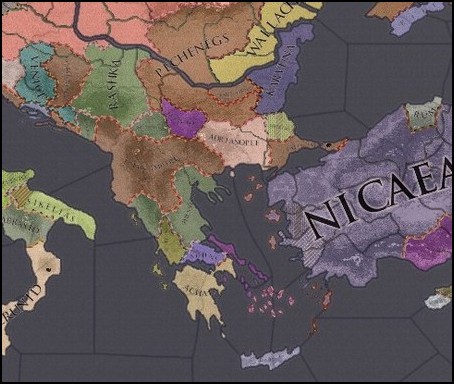
Further east, the Farzadid Empire of Persia was beginning to crumble after the death of its founder, with large tracts of Azerbaijan rebelling against Isfahan.
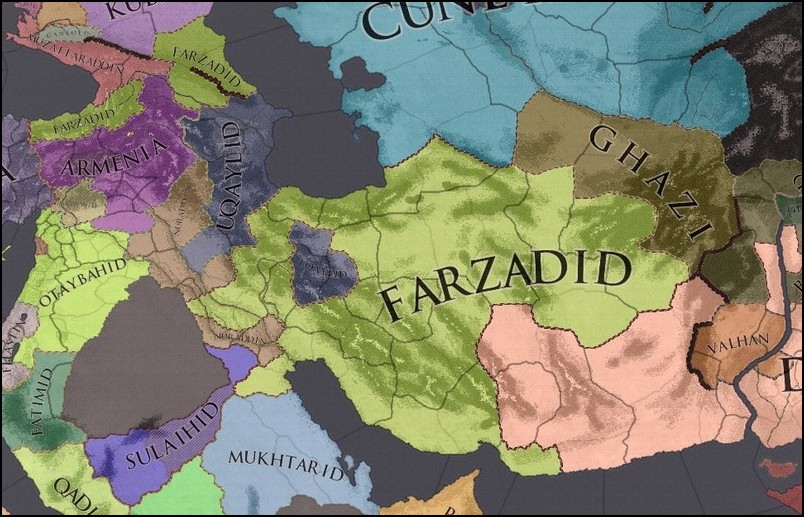
Back in Iberia, Grand Vizier Ali returned to the capital, his support bolstered after his decisive victory. As regent, he began to educate young Sayf on the duties of a sultan, providing him with the very best tutors that the House of Knowledge had to offer.
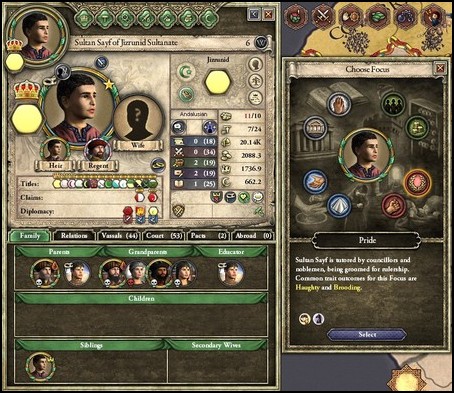
Al Andalus would not be left in peace for much longer, however. Late in 1410, several unruly nobles - including the emirs of Granada, Mursiya, Balansiyyah and Cagliari - banded into a league together and sent envoys to Qadis, demanding that Grand Vizier Ali either loosen his hold on the sultanate or face open revolt.
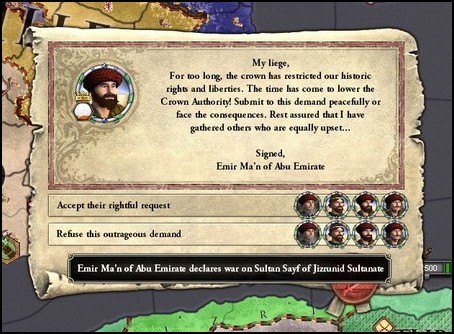
Grand Vizier Ali wasn’t one to shy away from a conflict, however, and sent the heads of the envoys back to their masters.
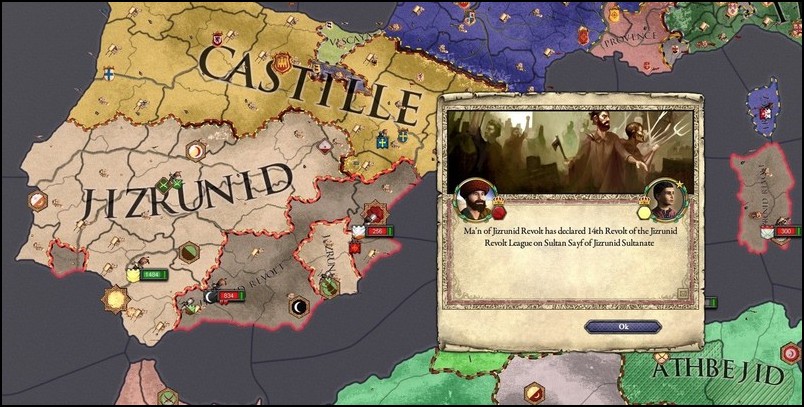
The recent war with the Christians had been a taxing one, however, so Ali was only able to raise a host of 18,000 levies. Faced with a significantly more powerful enemy, the vizier knew he had to make the first strike, quickly pinning down a rebel army near Qurtubah.
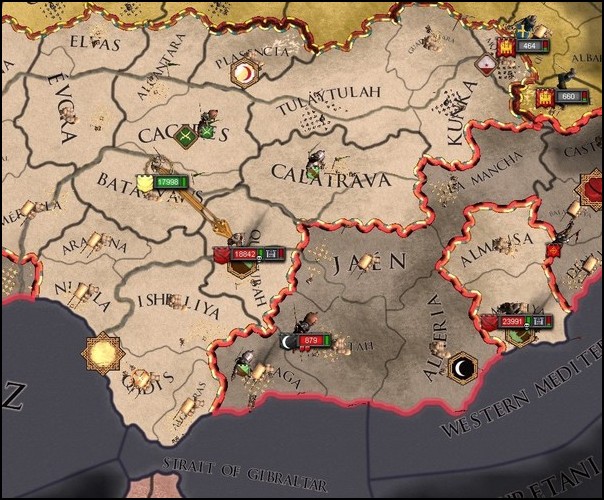
The loyalists had to make a difficult crossing to reach the enemy, but the river was still and tepid, and the Andalusi were able to take the besiegers by surprise.
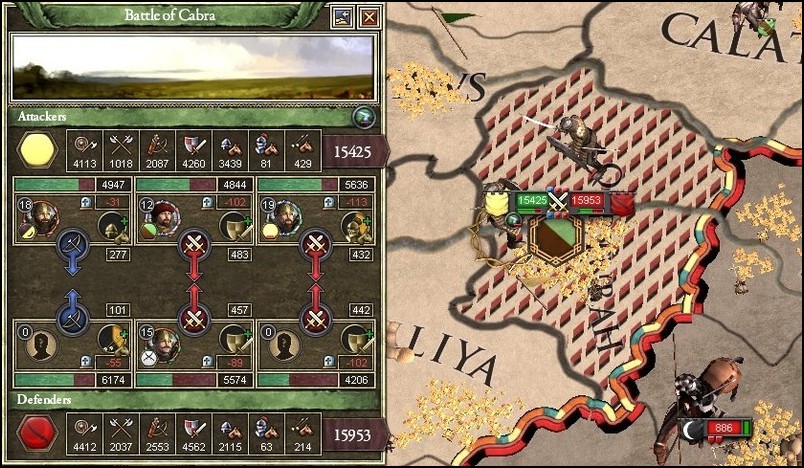
After a few hours of bloody fighting, the rebel lines were broken and they were forced to fall back, taking heavy casualties as they did so. And even better, the Emir of Balansiyyah drowned whilst crossing the river, with his heavy armour dragging him to murky depths after his boats were overturned.
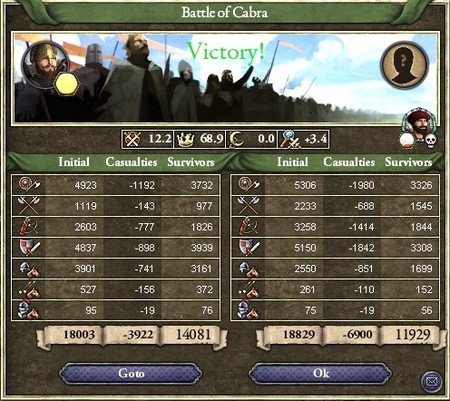
The battle wasn’t decisive, however, not by a long shot. The Andalusi pushed south and lay siege to the Red Fortress of Granada, sending a reconnaissance force further east to scout for further information.
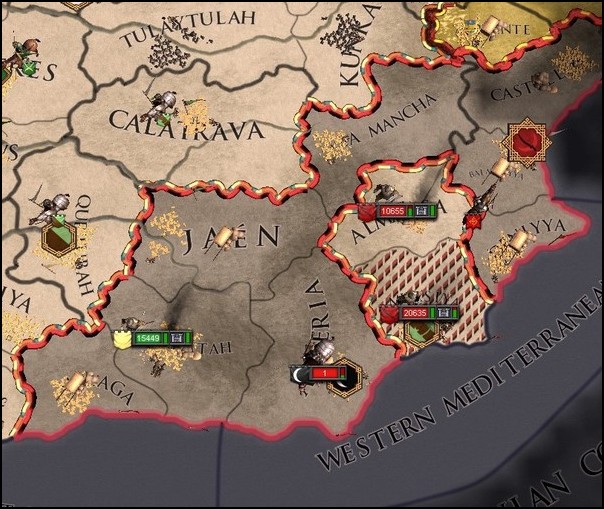
And the news they brought back wasn’t good…
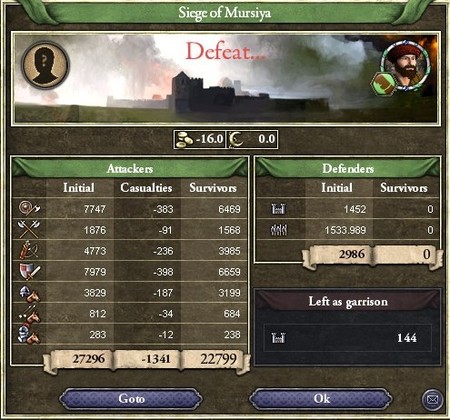
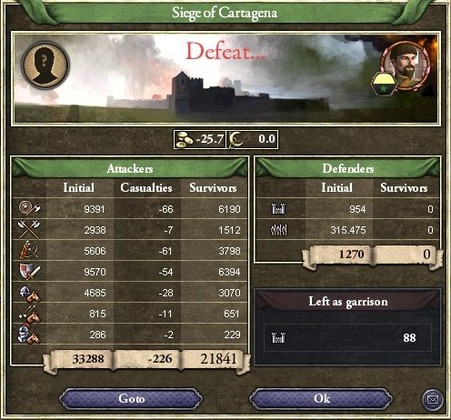
As fortresses began falling to the rebels, Grand Vizier Ali realised that he wouldn’t be able to overcome them without a larger army. So he secured a large loan from the Jewish community in Qadis, using it to raise a Berber mercenary force in north Africa, which was quickly sent to reinforce the existing Andalusi levies.
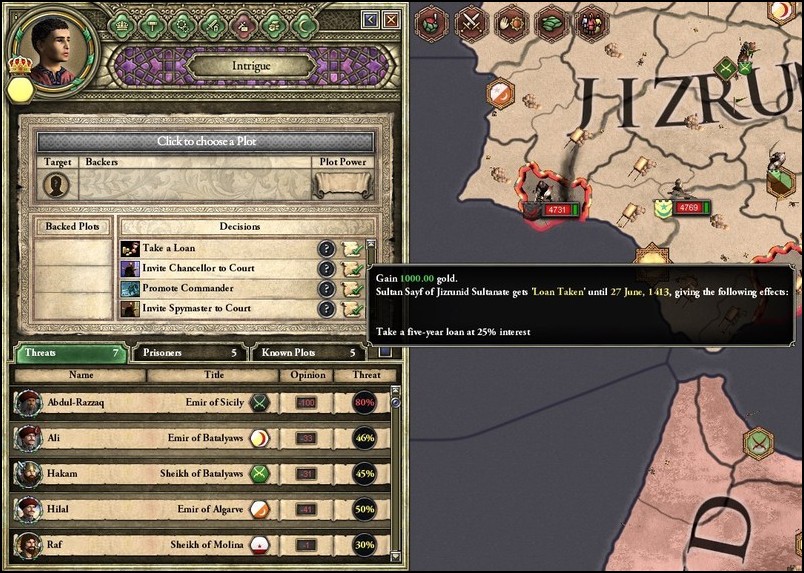
A week before the mercenaries arrived, however, the rebels sprung south in surprise attack and engaged the Andalusi army at Granada. In a bloody battle that nearly cost Grand Vizier Ali his life, the rebels managed to rout his forces and send them running, abandoning their siege of Granada as they did so.
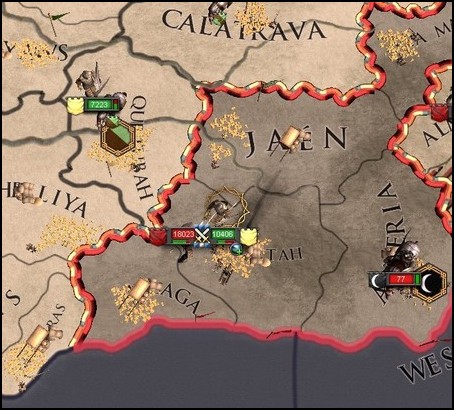
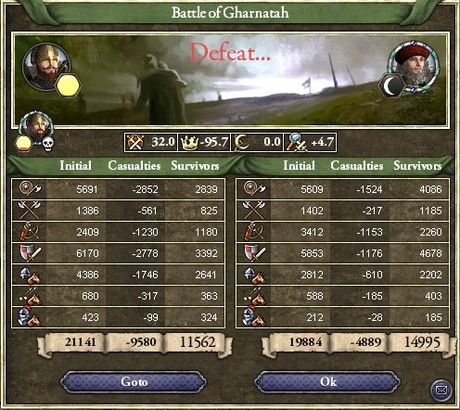
Having suffered heavy losses, the prospects of seizing a decisive victory were looking more bleak with every passing day. Ali retreated to Qadis, where he reorganised the remnants of his army before pushing north again. Without the numbers to carry out a successful attack, the vizier was forced to adopt a defensive strategy instead, and he managed to entice a rebel army into attacking him at Qalatrava.
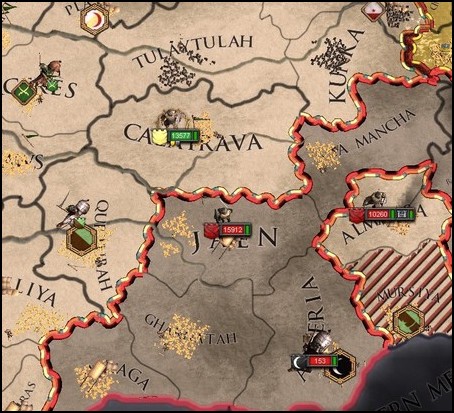
Ali positioned his forces along a river, and after falling on the rebels with countless devastating attacks and raids as they struggled against the current, the enemy abandoned the battle and fell back into friendly territory.
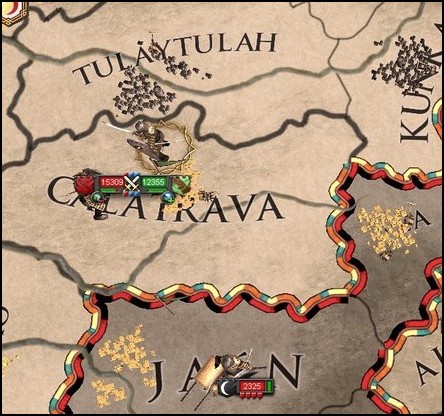
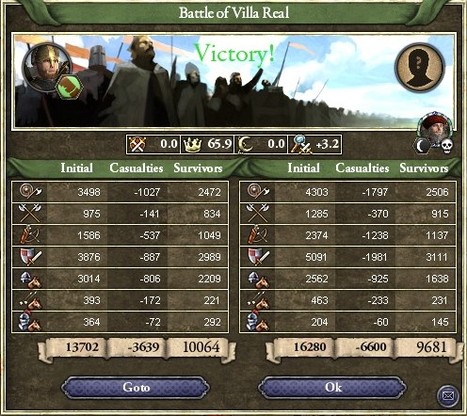
With his men reinvigorated and inspired once more, Ali shifted onto the offensive, engaging a hostile army at Jaén a few weeks later. Numerically weaker, the rebels didn’t hold long before being routed, with the loyalists scoring another important victory.
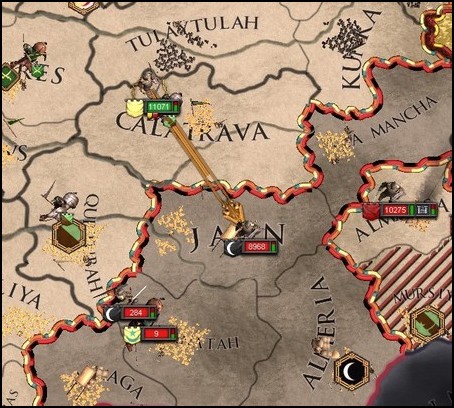
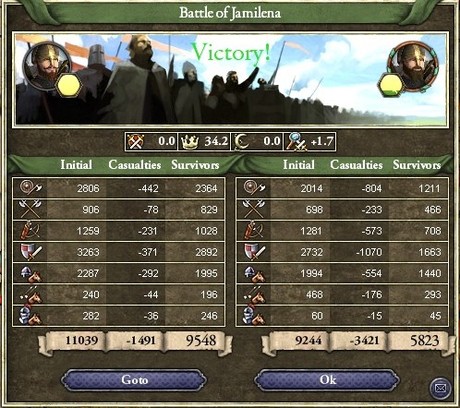
The Andalusi pushed towards Balansiyyah, where another rebel army was besieging Almansa, recapturing the strategically-important fortress of Mursiya along the way.
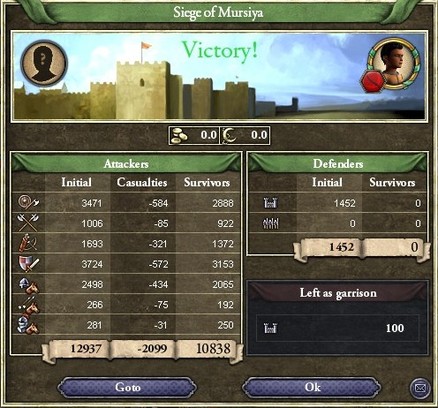
Early in 1413, Vizier Ali began the final offensive of the civil war, sending his forces to pin down and destroy the last of the rebels. The rebel army was slightly bigger, but it was full of tired and war-weary peasants, so it didn’t take much for the professional Mubazirun and mercenary forces to overwhelm them.
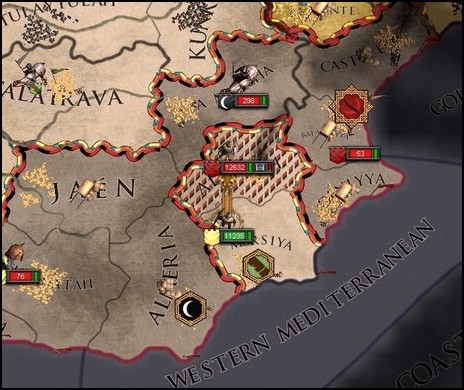
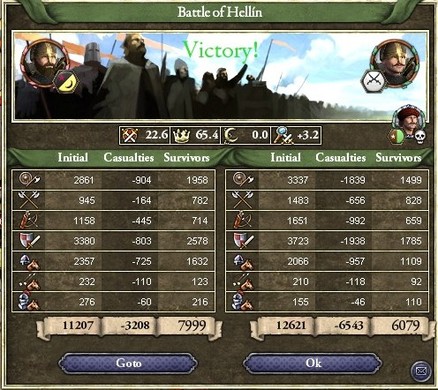
With the rebels on the run, it looked like the end of the civil war was finally in sight. Ali wanted to march on the rebel capital and burn it to the ground, sending a message to his rivals and enemies. Before he could do so, however, an exhausted runner arrived from Qadis, carrying an urgent message.
War with the Christians, and this time, they were the ones attacking.
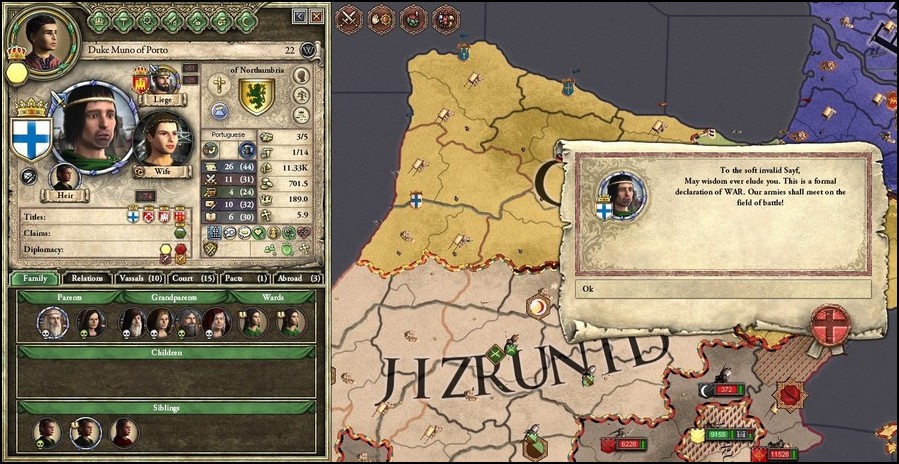
Surely backed by the King of Castille, Duke Muno of Porto declared his intention to re-capture Lisbon and Algarve. And it didn’t end there, because more envoys arrived mere hours later, this time from France.
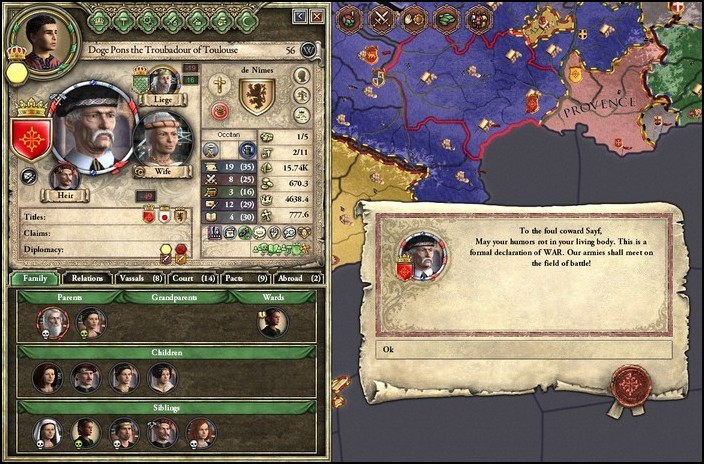
Doge Pons of Toulouse, a vassal of the King of France, was seeking to expand his holdings along the Mediterranean, and what was a juicier target than the war-torn and weakened Sultanate of Al Andalus?
And even then, as though invasions from two different directions were not enough, another declaration of war arrived just days later. This time from Palermo, Emir Abdul-Razzaq Jizrunid was no doubt eager to carve out his own piece of Al Andalus...
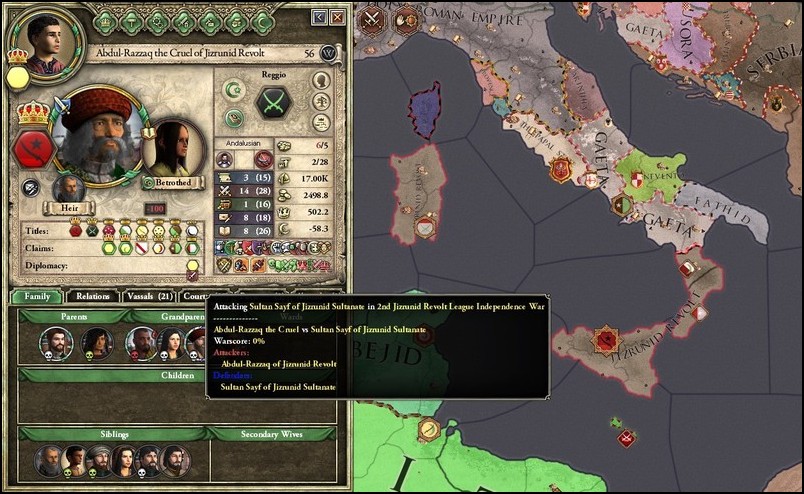
And all of the sudden, Grand Vizier Ali was faced with war in all directions, wars which he almost certainly could not win.
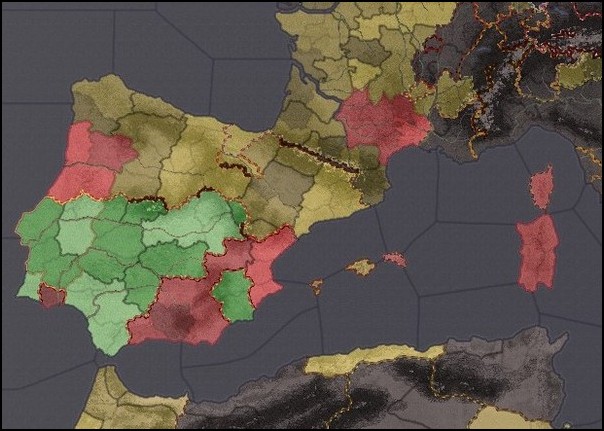
But that didn’t mean he wasn’t going to try. Ali quickly abandoned his plans to march on the rebel capital, instead sending an offer of peace, hoping to eliminate a front altogether.
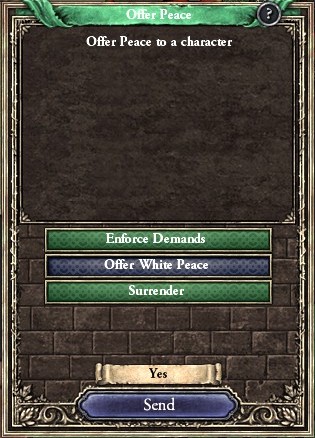
Before he could hear back from the rebels, however, Doge Pons’ army arrived from Toulouse. Boasting almost 18,000 men, the Occitans engaged the Andalusi at Balansiyyah, likely expecting an easy victory over the smaller army.
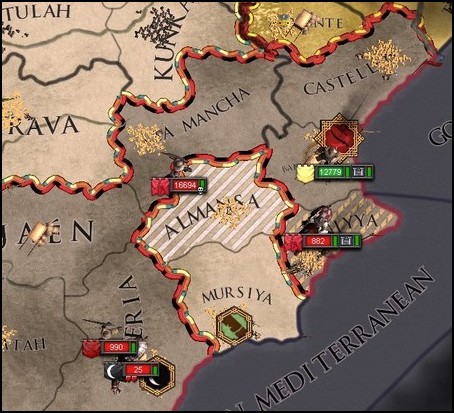
This army was made up of trained and tried soldiers, however, and they refused to fold. Instead, the Andalusi let the Occitans bleed themselves dry before counter-attacking in force, scoring a decisive victory after a few hours of bloody fighting.
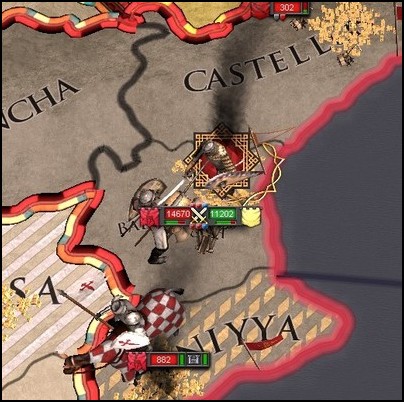
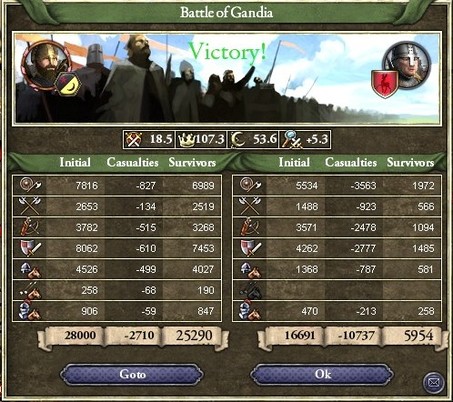
With the Occitans thrown back, Grand Vizier Ali was able to conclude a white peace with the rebels, who agreed to contribute some of their own levies to the defence of Al Andalus in return for full amnesty.
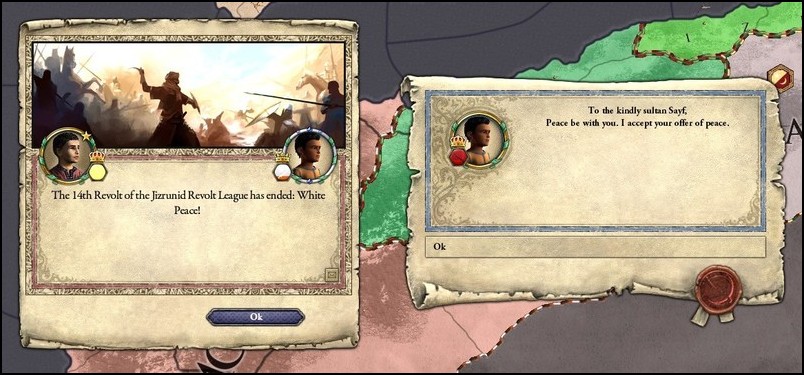
Ali then marched his bolstered army westward, where the Portuguese had captured Elvas and besieged Lisboa, the regional capital.
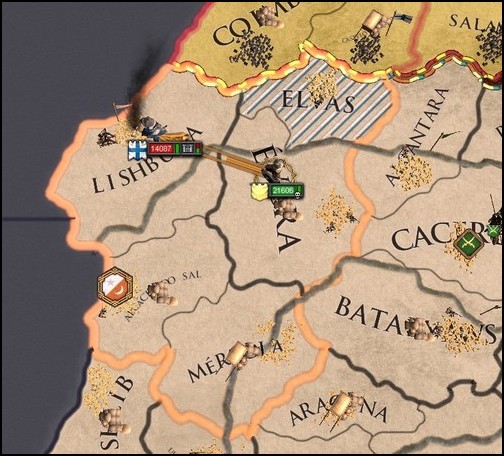
The battle was short and decisive, with almost ten thousand dead Portuguese littering the battlefield by day’s end.
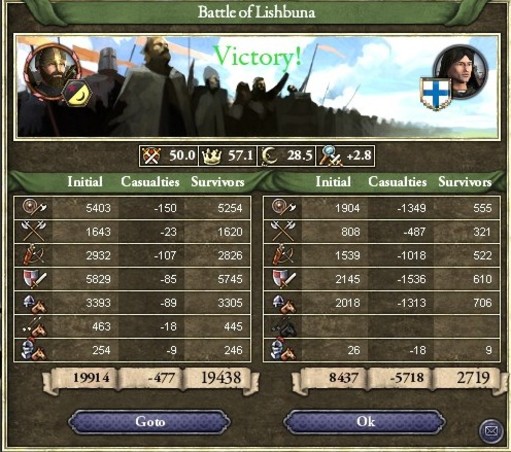
Shortly after the victory, Ali received news from the east, where the Sicilians managed to land near Mursiya. They then marched on the fortress, which was little more than ruins at this point, and captured it after a short siege.
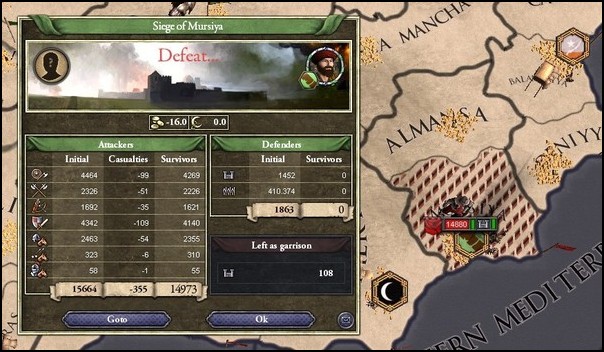
Ali knew he had to deal with one opponent at a time, however, so he decided to march on Porto rather than turn around. The Portuguese capital was lightly-fortified, so it didn’t take much to scale the walls and capture the citadel, bringing their short-lived invasion to an end.

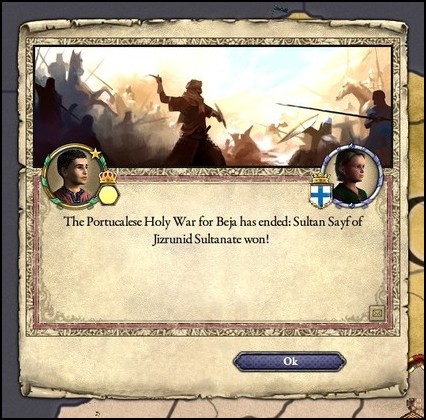
With that, Grand Vizier Ali began the long march back to the east, where the Occitans and the Sicilians were pillaging and burning without opposition. Before he even entered Al Andalus again, however, yet another declaration of war arrived…
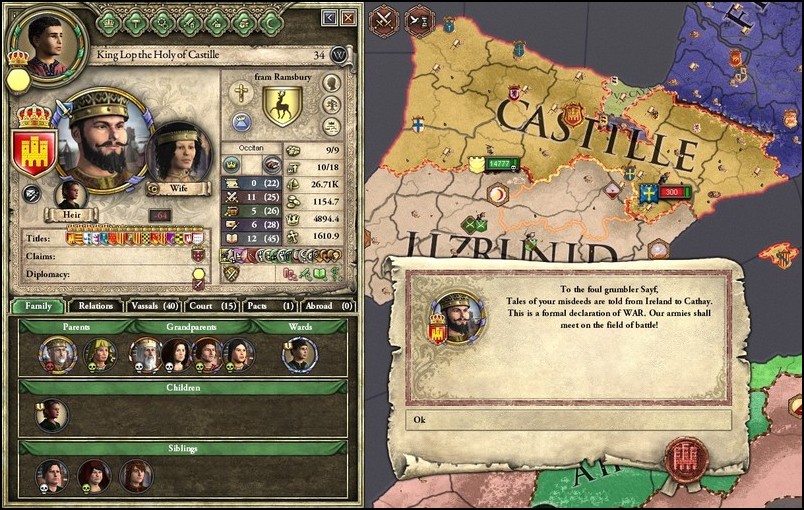
The new century has only just begun, but already, it’s looking like it’ll be a century of chaos and mayhem, a century of unrest and turmoil, a century of bloodshed and war.
edit; By the way, the Emir of Palermo (who just declared the independence war), is actually a Jizrunid. He's descended from Raf, the son of Sultan Ayyub the Victorious and brother of Sultan Ali the Mad, and apparently he decided to form a cadet dynasty - the ‘Reggios’ - but I'm just gonna keep referring to them as Jizrunids.
